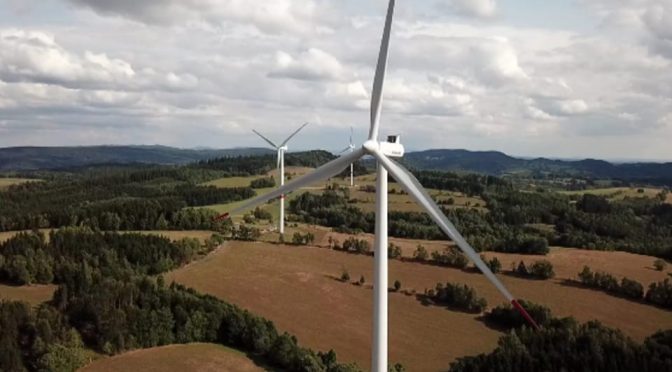The Czech Republic could go in two decades from having hardly any wind turbines in its fields to basing a quarter of its electricity consumption on this type of renewable energy.
At present, in the Czech Republic, with a relatively large deployment of solar plants for a decade, wind energy produces only 1% of the electricity consumed in the country. The image of wind turbines so typical already in so many European states is not typical of the Czech Republic, where there are only two hundred wind power plants at the moment.
This may begin to change rapidly in the face of increased investor interest in increasingly cheaper energy. Meteorologist and wind energy expert David Hanslian, from the Institute of Atmospheric Physics of the Academy of Sciences, told Czech Radio why wind energy production is becoming more profitable.
“It is due to various reasons. The first is because technology keeps improving. Another is that it also improves the ability to build more wind turbines. And the third is that more and more wind turbines are being made, which means savings in terms of the amount of land needed to build a station. Furthermore, for this reason they reach a higher altitude, where the wind conditions are more favorable for electricity production ”.
David Hanslian estimates that by the year 2040 electricity consumption in the Czech Republic will be based largely on the force of the wind, to the detriment, above all, of coal and natural gas.
“It can be between 10% and 25% of the country’s electricity consumption, counting on it to grow. If we take the current data for electricity consumption, it would be a third of the total ”.
To do this, according to Hanslian, it would take a thousand more wind power plants than the current ones. The southern states of Germany or Austria have shown that Central Europe can also make good use of wind as a source of energy. In the Czech Republic, the most favorable area would be the highlands of Vyso?ina.
Hanslian points out that the impact on fauna, which basically can be suffered by birds and bats, is minimal, since in places where there is a potential risk to birds, the law does not allow their installation. In the case of bats, it is enough to turn off the wind power plant overnight.
Nor can they be built in protected natural areas or near towns, which is why Hanslian considers the bad image that this type of energy sometimes has among citizens to be unfounded.
“The biggest barrier is in people’s heads, in the way they talk about this type of energy and in the issues that are emphasized when it comes to wind power plants. If you follow the discourse of many politicians and people who write about it, you can see that the negative aspects are highlighted without highlighting that it is one of the cleanest energies that we have at our disposal and that it is cheap ”.
The past month of November has been the hottest in history worldwide since there is evidence, and so will the year 2020 in general, as published this Monday by the European climate program Copernicus. The Czech Republic is not particularly distinguishing itself in its efforts against climate change, but rather the opposite. The Climate Action Network also released on Monday the ranking of countries according to their efforts in the fight against climate change, led by Sweden, the United Kingdom and Denmark worldwide. Among the members of the European Union, the Czech Republic was ranked fifth worst, only ahead of countries such as Poland, Hungary and Slovenia.


